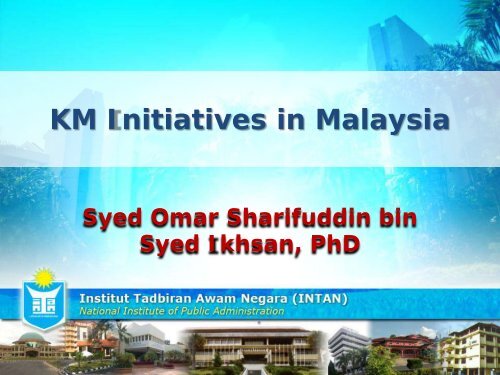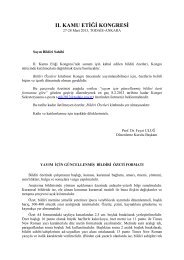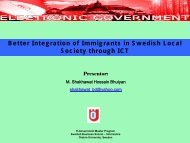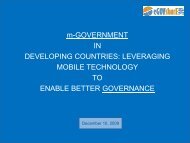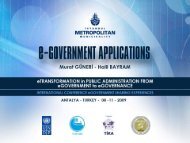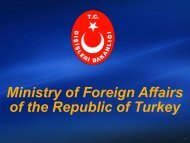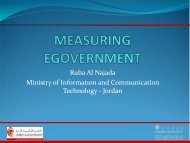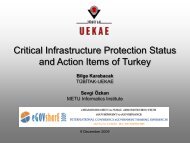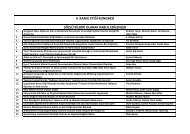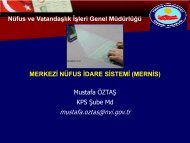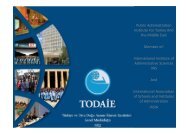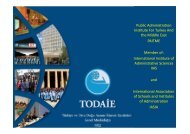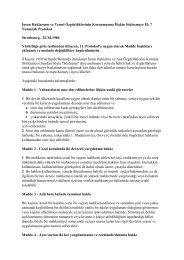Syed Omar Sharifuddin bin Syed Ikhsan
Syed Omar Sharifuddin bin Syed Ikhsan
Syed Omar Sharifuddin bin Syed Ikhsan
Create successful ePaper yourself
Turn your PDF publications into a flip-book with our unique Google optimized e-Paper software.
KM Initiatives in Malaysia<br />
<strong>Syed</strong> <strong>Omar</strong> <strong>Sharifuddin</strong> <strong>bin</strong><br />
<strong>Syed</strong> <strong>Ikhsan</strong>, PhD
Malaysia started to lay the foundation for its<br />
knowledge-based economy in the early 1990s as a<br />
conscious effort to enhance competitiveness and<br />
increase wealth creation.<br />
Specific initiatives were undertaken to accelerate the<br />
development of human resource, information and<br />
communication technology, info-structure, science and<br />
technology, research and development capability as<br />
well as to introduce appropriate financing mechanisms
High-tech<br />
Manufacturing<br />
& Services<br />
Knowledge<br />
Based<br />
Primary<br />
Commodities<br />
Labour<br />
Driven<br />
1960<br />
Assembly type<br />
Manufacturing<br />
Labour<br />
Driven<br />
1970<br />
Medium-tech<br />
Manufacturing<br />
& Services<br />
Investment<br />
Driven<br />
1980<br />
Productivity<br />
Driven<br />
1995<br />
Knowledge<br />
& Technology<br />
Driven<br />
2000 & beyond
Malaysia’s Journey …….<br />
• Vision 2020 was launched in February 1991. The vision<br />
committed Malaysia to become “scientific and progressive<br />
society”, “ an economy that is … fully able to adapt, innovate<br />
and invent, that is increasingly technology-incentives …” and<br />
“an economy driven by brain power, skills and diligence, in<br />
possession of a wealth of information..”<br />
• National Information Technology Agenda (NITA)<br />
– to foster the development of IT as a strategic<br />
enabler of dynamic economic growth.<br />
• Multimedia Super Corridor (MSC) – to<br />
be an engine of economic growth for the<br />
21 st century<br />
• Knowledge-based Economy Master Plan
Generic Office<br />
Environment (GOE)<br />
E-Syariah<br />
Electronic Procurement<br />
(eP) Project<br />
Electronic Labour<br />
Exchange (ELX)<br />
Human Resource<br />
Management<br />
Information System<br />
(HRMIS)<br />
Electronic Service<br />
Directory (eService)<br />
Project Monitoring<br />
System (PMS)
CITIZENS<br />
• Assessment of Tax Payments<br />
• Utilities Payment<br />
• Higher Education Loan/Scholarship<br />
Application<br />
• Job Application<br />
• Public Facilities Booking<br />
• Renewal of Driving License<br />
• Loan Repayment<br />
• Summons Settlement<br />
• Computerization Project Registration<br />
• Pensions and Gratuity Calculation<br />
• Public Service Exams Application<br />
• Home Loan Balance Enquiry<br />
• Public Service Department’s Cyber<br />
Counseling<br />
• Day With Client’s Online<br />
GOVERNMENT<br />
BUSINESS<br />
• Vehicle Importation License (AP)<br />
• Business Registration<br />
• Bumiputera Contractor Status<br />
Application<br />
• Housing Developer License<br />
Registration<br />
• Domestic Shipping License Application<br />
• MARA Business Premises Rental<br />
• Malaysia’s My Second Home Program<br />
Application<br />
• Visitors Visa Application for certain<br />
destinations<br />
• Foreign Student Visa Application<br />
NON-CITIZENS
eKL Initiative Project has won the<br />
Government Technology Award<br />
2009 in category of Technology<br />
Leadership at Bali, Indonesia on<br />
9th October 2009<br />
mySMS 15888, part of eKL Initiative<br />
Project has won MSC Malaysia APICTA<br />
2009 award in category Best of<br />
eGovernment & Services on 8 October<br />
2009 at PWTC, Kuala Lumpur.<br />
mySMS Project won the Public<br />
Services Empowerment<br />
Through Mobility Innovations<br />
Awards on 21st October 2009.
To cultivate and secure the necessary human resources<br />
To establish the institutions necessary to champion, mobilise and<br />
drive the transition of K-based economy<br />
To ensure the incentives, infrastructure and infostructure necessary to<br />
prosper the optimal of knowledge in all sectors of the economy<br />
To increase the capacity for the acquisition and application of<br />
science and technology<br />
To ensure that the private sectors spearhead the K-based<br />
Economy development<br />
To develop knowledge-based civil servants<br />
To bridge the knowledge and digital divides
Policies and Strategic Directions (Goals and Targets)<br />
A Public service which is skilful, knowledgeable,<br />
efficient and competent<br />
A people-centered public service which is proactive and<br />
responsive to the needs of the people<br />
A public service which is more open and accountable<br />
A public service which fully adopts and leverages upon<br />
ICT to enhance its efficiency and productivity
9 th Malaysian Plan<br />
THRUST 1 THRUST 2 THRUST 3 THRUST 4<br />
THRUST 5<br />
To move the<br />
economy up to<br />
the values<br />
chain. The<br />
economy will be<br />
centered on<br />
human capital<br />
To raise the<br />
capacity for<br />
knowledge<br />
and<br />
innovation<br />
and nurture<br />
first class<br />
mentality<br />
To address<br />
persistent<br />
socio-economic<br />
inequalities<br />
constructively<br />
and<br />
productively<br />
To improve the<br />
standard of<br />
sustainability in<br />
the quality of<br />
life<br />
To strengthen<br />
the institutional<br />
and<br />
implementation<br />
capacity
Case 1<br />
This study is aimed to investigate the relationship between<br />
organizational elements and knowledge transfer performance<br />
in the Ministry of Entrepreneur Development of Malaysia.<br />
Current Position<br />
Sex<br />
Male Female<br />
Frequency Percent<br />
Under Secretary/Director 5 0 5 3.2<br />
Principal Assistant Secretary/Director 15 8 23 14.9<br />
Assistant Secretary/Director 24 22 46 29.9<br />
Engineer 5 4 9 5.8<br />
Information System Officer 3 1 4 2.6<br />
Assistant Administration Officer 16 24 40 26.0<br />
Technical Assistant 7 7 14 9.1<br />
Assistant Information System Officer 3 6 9 5.8<br />
Others 0 4 4 2.6<br />
<strong>Syed</strong> <strong>Omar</strong> <strong>Sharifuddin</strong> <strong>Syed</strong> <strong>Ikhsan</strong> (2005) (Thesis)
Sharing Culture<br />
Individualism<br />
Training/Management Support<br />
Posting<br />
Knowledge Transfer<br />
Performance<br />
Communication Flow<br />
ICT Infrastructure<br />
ICT Knowhow
RESULTS<br />
p = 0.24**<br />
Training/<br />
Management<br />
Support<br />
(X 1 )<br />
Posting<br />
(X 4 )<br />
ICT<br />
Infrastructure<br />
(X 2 )<br />
p = 0.31**<br />
p = 0.50**<br />
p = 0.31**<br />
p = 0.25*<br />
p = 0.27**<br />
p = 0.20**<br />
p = 0.13**<br />
ICT<br />
Know-how<br />
(X 3 )<br />
p = 0.34**<br />
Knowledge<br />
Transfer<br />
Performance<br />
(Y 1 )<br />
p = 0.34**<br />
p = 0.34**<br />
p = 0.20**<br />
p = 0.13*<br />
*Correlation is significant at 0.05 level<br />
** Correlation is significant at 0.01 level<br />
p = 0.16*<br />
p = 0.40**<br />
Sharing<br />
Culture<br />
(X 5 )<br />
p = 0.17*<br />
Communication<br />
Flow<br />
(X 6 )<br />
Individualism<br />
(X 7 )<br />
p = 0.29*<br />
The variables that have a<br />
significant positive relationship are<br />
training/management support, ICT<br />
know-how, sharing culture and<br />
individualism. Three other<br />
variables, ICT infrastructure,<br />
posting and communication flow,<br />
have no significant relationship<br />
with the performance of<br />
knowledge transfer. The study also<br />
reveals that several independent<br />
variables that were identified in<br />
the study show a positive<br />
relationship among them. The<br />
important independent variables<br />
that correlate with almost all the<br />
other independent variables are<br />
sharing culture and<br />
training/management support.
Case 2<br />
This study is aimed to explore the role of KM in Local Authorities<br />
(LA) toward achieving the E-Government orientation in Malaysia.<br />
Types of Local<br />
Authority<br />
Number of<br />
Local Authority<br />
Respondent<br />
(N)<br />
Senior<br />
Management<br />
Middle<br />
Management<br />
City Council 2 43 (27%) 7 (16%) 36 (84%)<br />
Municipal Council 6 91 (57%) 17 (19%) 74 (81%)<br />
District Council 5 26 (16%) 2 (8%) 24 (92%)<br />
Total 13 160 26 (16%) 134 (92%)<br />
Demographic Profile:<br />
Mean Median Mode<br />
Age 38 37 30<br />
Work Experience 10 7 4<br />
Salleh, K., <strong>Syed</strong> Ahmad, S. N. and <strong>Syed</strong> <strong>Ikhsan</strong>, S. O. S. (2009). Knowledge Management in Electronic Government:<br />
The Organisational Readiness of Local Authorities in Malaysia, Public Sector ICT Management Review, Vol. 3 No.1
Findings:<br />
The level of awareness of the management staff shows that the Local Authorities are<br />
well prepared to adopt the KM Implementation strategy to serve as a platform for the<br />
implementation of E-Government.<br />
There seem to be a gap in the requisite skills and knowledge of ICT as the number of<br />
officers both in the senior and middle management who levels have given advanced ICT<br />
training is only 27%.<br />
Respondents feel that communication channels and KM technologies such as internet<br />
access, intranet, groupware and lotus notes should be made available for knowledge<br />
transfer and sharing among the senior and middle management officers.<br />
The traditional mode of communication channels such as face to face meeting and<br />
paper documentation is perceived as moderately important for the KM environment.<br />
CONCLUSION<br />
The exploratory study on the level of organizational readiness of KM adoption in LAs in terms<br />
of physical assets (physical resources) and intellectual assets (human recourses), it can be<br />
concluded that the KM implementation strategy is indeed a suitable platform for the LAs to<br />
transform towards and E-Government paradigm.
Case 3<br />
This study is aimed to investigate the relationship between<br />
the learning factors of professional intellects and the transfer<br />
of explicit knowledge in the Accountant General Department<br />
(AGD) of Malaysia.<br />
Type of Public Sector<br />
Organisation<br />
Number of<br />
questionnaires<br />
distributed<br />
Number of<br />
questionnaires<br />
returned and analysed<br />
Top and<br />
Senior<br />
Management<br />
Middle<br />
Management<br />
Federal Government<br />
(Specific Accounting Function)<br />
365 203 (55.6%) 90 (44%) 113 (56%)<br />
Kalsom Salleh, <strong>Syed</strong> Noh <strong>Syed</strong> Ahmad and <strong>Syed</strong> <strong>Omar</strong> <strong>Sharifuddin</strong> <strong>Syed</strong> <strong>Ikhsan</strong> (2008), Knowledge<br />
Management and Public Sector Accountants: The Relationship Between Learning Factors and<br />
Knowledge Transfer Performance, Seminar Penyelidikan Sektor Awam, 8 – 9 April 2008, INTAN,<br />
Malaysia
Training and Learning<br />
opportunities<br />
Job Rotation<br />
Performance Evaluation and<br />
Incentive<br />
Knowledge Transfer<br />
Performance<br />
ICT Skills and know-how<br />
H1: There is a positive relationship between training and learning opportunities<br />
of public sector accountants and knowledge transfer performance.<br />
H2: There is a positive relationship between job rotation of public sector<br />
accountants and knowledge transfer performance.<br />
H3: There is a positive relationship between performance evaluation and<br />
incentive of public sector accountants and knowledge transfer performance.<br />
H4: There is a positive relationship between ICT skills and know-how of public<br />
sector accountants and knowledge transfer performance.
Training and learning<br />
opportunities<br />
Training and<br />
learning<br />
opportunities<br />
Job Rotation<br />
Performance<br />
Evaluation &<br />
Incentives<br />
ICT Skills and<br />
Know-how<br />
Knowledge<br />
Transfer<br />
Performance<br />
1 .318** .706** .547** .532**<br />
Job Rotation .318** 1 .288** .158* .211**<br />
Performance<br />
Evaluation &<br />
Incentives<br />
ICT Skills and Knowhow<br />
Knowledge Transfer<br />
Performance<br />
.708** .288** 1 .468** .483**<br />
.547** .158* .468** 1 .389**<br />
.532** .211** .483** .389** 1<br />
**Correlation is significant at the level of 0.01 (2 tailed)<br />
* Correlation is significant at the level for 0.05 (2 tailed)<br />
RESULTS<br />
The correlation for the four (4) measures of learning factors and one (1) measure of<br />
knowledge transfer performance was positive and significant; thus, providing<br />
insights on the impact of learning factors on the transfer performance of explicit<br />
knowledge. Training and learning opportunities are seen to be as one of the most<br />
important independent variables that have significant relationship with dependent<br />
variables and other independent variables.
Case 4<br />
Sample<br />
• N = 428 (195 male/233 female)<br />
• Respondent involved directly in policy making of the public<br />
sector human resources<br />
• Middle management (grade 44, 48, 52, 54)<br />
• 3 Central Agencies<br />
Knowledge Sharing<br />
Quality (Cronbach<br />
Alpha – 0.827)<br />
- Relevant<br />
- Easy to understand<br />
- Accurate<br />
- Completeness<br />
- Reliability<br />
- Timelines<br />
Service Delivery<br />
Improvement<br />
(Cronbach Alpha –<br />
0.905)<br />
- Fast<br />
- Quality<br />
- Satisfy the<br />
customers<br />
Result:<br />
1. There is a moderate<br />
correlation (R=0.489)<br />
between knowledge<br />
sharing quality and<br />
public sector service<br />
delivery<br />
Ismail, M. B., Mohammad Yusof, Z and <strong>Syed</strong> <strong>Ikhsan</strong>, S. O. S. (2009). The Relationship Between Knowledge Sharing<br />
Quality and Public Sector Service Delivery, International Journal of Economics and Development, Vol. 1, No. 1
National Institute of Public Administration<br />
The National Institute of Public Administration (INTAN) is<br />
the heart of the public sector human capital development<br />
that provides and facilitates the necessary training for<br />
public sector workforce. Investing in knowledge workforce<br />
development is a high priority for the Government to<br />
improve public service delivery.<br />
Vision<br />
Mission<br />
Motto<br />
Slogan<br />
- To be a world class public sector training institution<br />
- To develop human capital in the public sector through<br />
excellence in training<br />
- Training for development<br />
- Always Ahead<br />
4
Public Sector E-Learning<br />
INTAN Employee Portal
Quality Manual<br />
INTAN Training<br />
Information and<br />
Management System<br />
(I-TIMS)
Technology is used to pioneer, sustain and innovate in the following ways:<br />
K-Sharing<br />
K-Preservation<br />
Portal<br />
Forum<br />
E-Mail<br />
Portal<br />
Database<br />
Kiosk<br />
K-MIND@INTAN Portal<br />
Electronic Learning History<br />
21
<strong>Syed</strong> <strong>Omar</strong> <strong>Sharifuddin</strong> <strong>Syed</strong> <strong>Ikhsan</strong>, PhD<br />
syedomar@intanbk.intan.my, sossi3@yahoo.com<br />
+603-20847433, +6019-2677989


